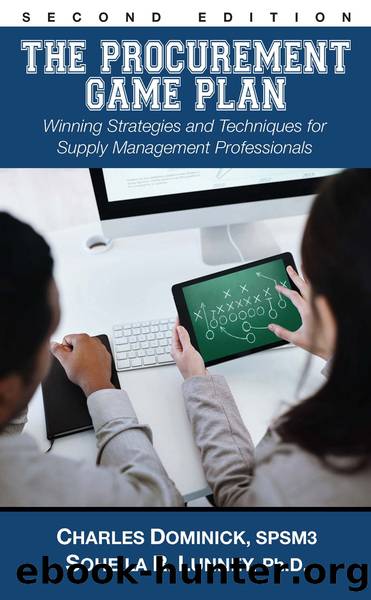The Procurement Game Plan by Charles Dominick

Author:Charles Dominick
Language: eng
Format: epub
Publisher: J. Ross Publishing
Published: 2022-01-15T00:00:00+00:00
Figure 8.4 Appropriate times to negotiate
INCREASING YOUR NEGOTIATION CONFIDENCE
The foregoing aspects of negotiation preparation are important. However, a skilled sales negotiator can disarm you, even if youâre only missing one ingredient: your confidence.
Power persuades, and confidence translates into power. Can you learn to be more confident? Absolutely! Here are five specific things to do to be more confident in negotiations:
VisualizeâEarly in preparing to negotiate, take time to visualize a successful end result. Picture yourself shaking hands with your supplier and smiling. Imagine how youâll feel when youâve secured a great deal for your organization. Most tangible results start with a thought that is later brought to reality. If you canât think it, you will have a harder time achieving it. So, visualize, and feel the power!
RehearseâBefore going into any negotiations, you and the members of your negotiating team need to rehearse different scenarios and questions. Having up-front agreements and speaking with one voice will provide the necessary confidence that you and your team members need for a successful negotiation outcome.
AffirmâSay this out loud to yourself throughout your preparations: âI am a confident negotiator.â The last time you are by yourself prior to commencing a negotiation, say it to yourself again. The negotiation power that your supplier will sense about you stems from outward evidence that you believe in yourself. Affirmations strengthen your belief in yourself.
Use confident languageâSuppliers who are trained in negotiation look for signs of weakness in you through your behavior and the words that you use. Try to never appear subservient or in doubt. For example, saying, âYour brochure said that technical support is included with every purchase, but your proposal said that support is available for an extra charge. So, I guess that you canât include support for free, right?â is weak. Donât expect to change a supplierâs mind about the deal with words like that. Say, âYour brochure said that technical support is included with every purchase, but your proposal said that support is available for an extra charge. Letâs fix that.â This sends the signal that you are confident and in control, and that you have power. The opening minutes of a negotiation are a particularly critical time for using confident language. Avoid using words such as like, prefer, look for, and target. Replace them with words like need, must have, and it is essential when you open the negotiations. Not only are these words stronger, more important, they show your confidence and the criticality of your priorities.
Self-assessâDuring a negotiation break, ask yourself, âWas I confident? Did not appearing confident hurt me? What can I do to appear more confident?â In addition to showing that you are confident, you must be knowledgeable and have done thorough research about the products or services that you are going to purchase. Remember that knowledge is power!
Download
This site does not store any files on its server. We only index and link to content provided by other sites. Please contact the content providers to delete copyright contents if any and email us, we'll remove relevant links or contents immediately.
Bad Blood by John Carreyrou(5780)
Principles: Life and Work by Ray Dalio(5334)
Rich Dad Poor Dad by Robert T. Kiyosaki(5162)
Management Strategies for the Cloud Revolution: How Cloud Computing Is Transforming Business and Why You Can't Afford to Be Left Behind by Charles Babcock(4135)
The Confidence Code by Katty Kay(3576)
Thinking in Bets by Annie Duke(3540)
Playing to Win_ How Strategy Really Works by A.G. Lafley & Roger L. Martin(3019)
American Kingpin by Nick Bilton(2983)
Delivering Happiness by Tony Hsieh(2926)
Project Animal Farm: An Accidental Journey into the Secret World of Farming and the Truth About Our Food by Sonia Faruqi(2667)
Brotopia by Emily Chang(2594)
I Live in the Future & Here's How It Works by Nick Bilton(2531)
Mastering Bitcoin: Programming the Open Blockchain by Andreas M. Antonopoulos(2517)
The Power of Habit by Charles Duhigg(2497)
The Content Trap by Bharat Anand(2496)
The Marketing Plan Handbook: Develop Big-Picture Marketing Plans for Pennies on the Dollar by Robert W. Bly(2421)
The Tyranny of Metrics by Jerry Z. Muller(2407)
Building a StoryBrand by Donald Miller(2368)
Applied Empathy by Michael Ventura(2334)
